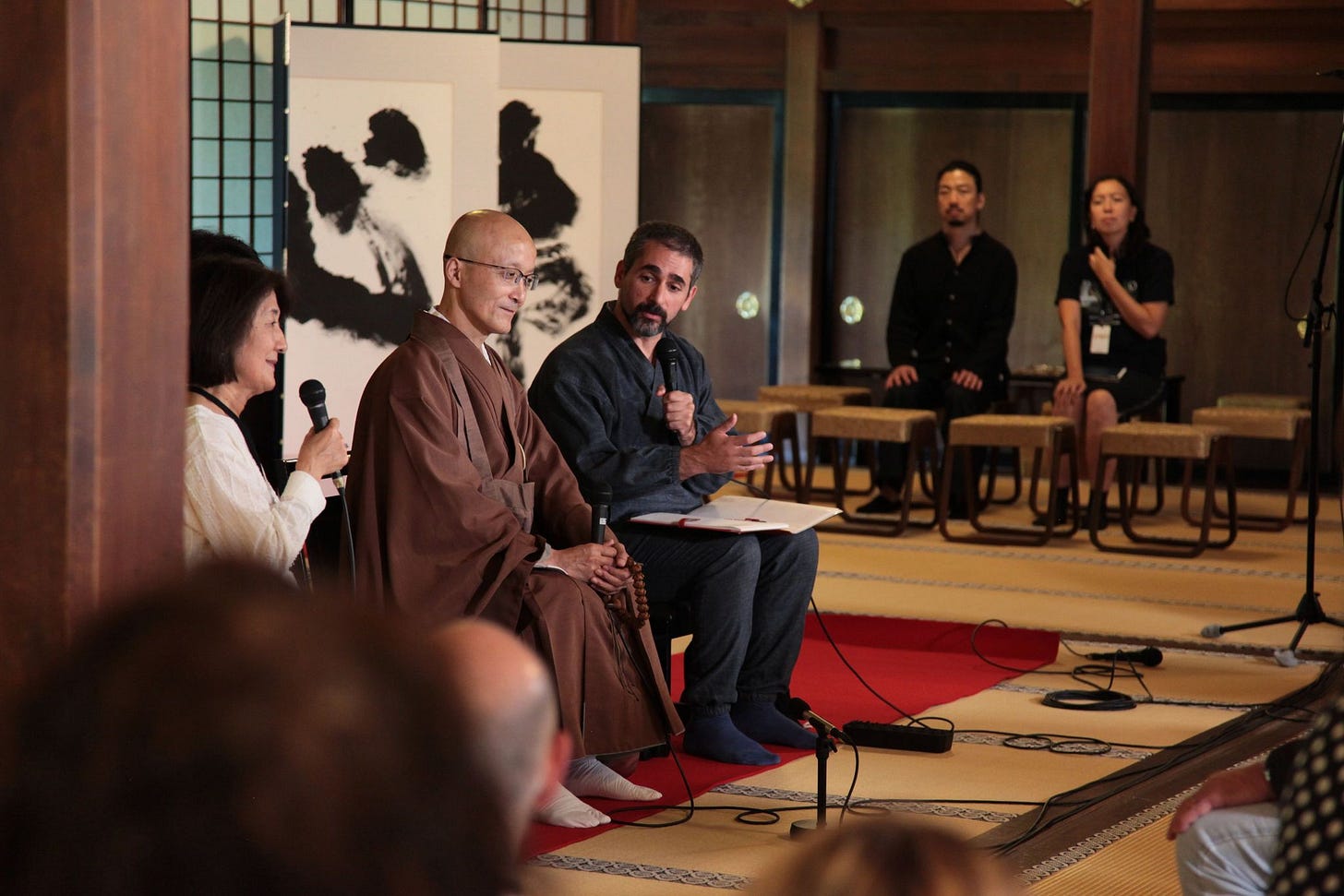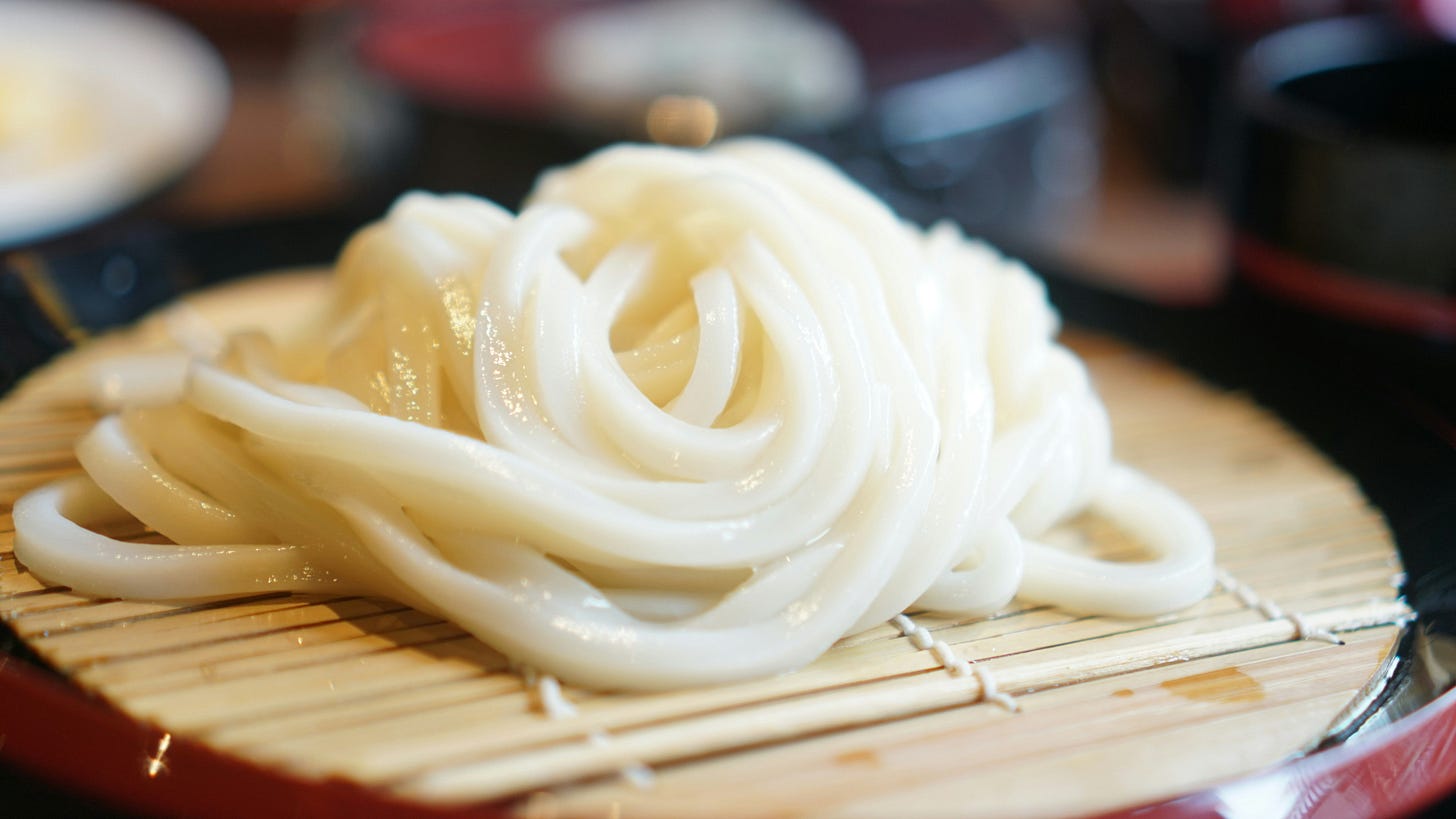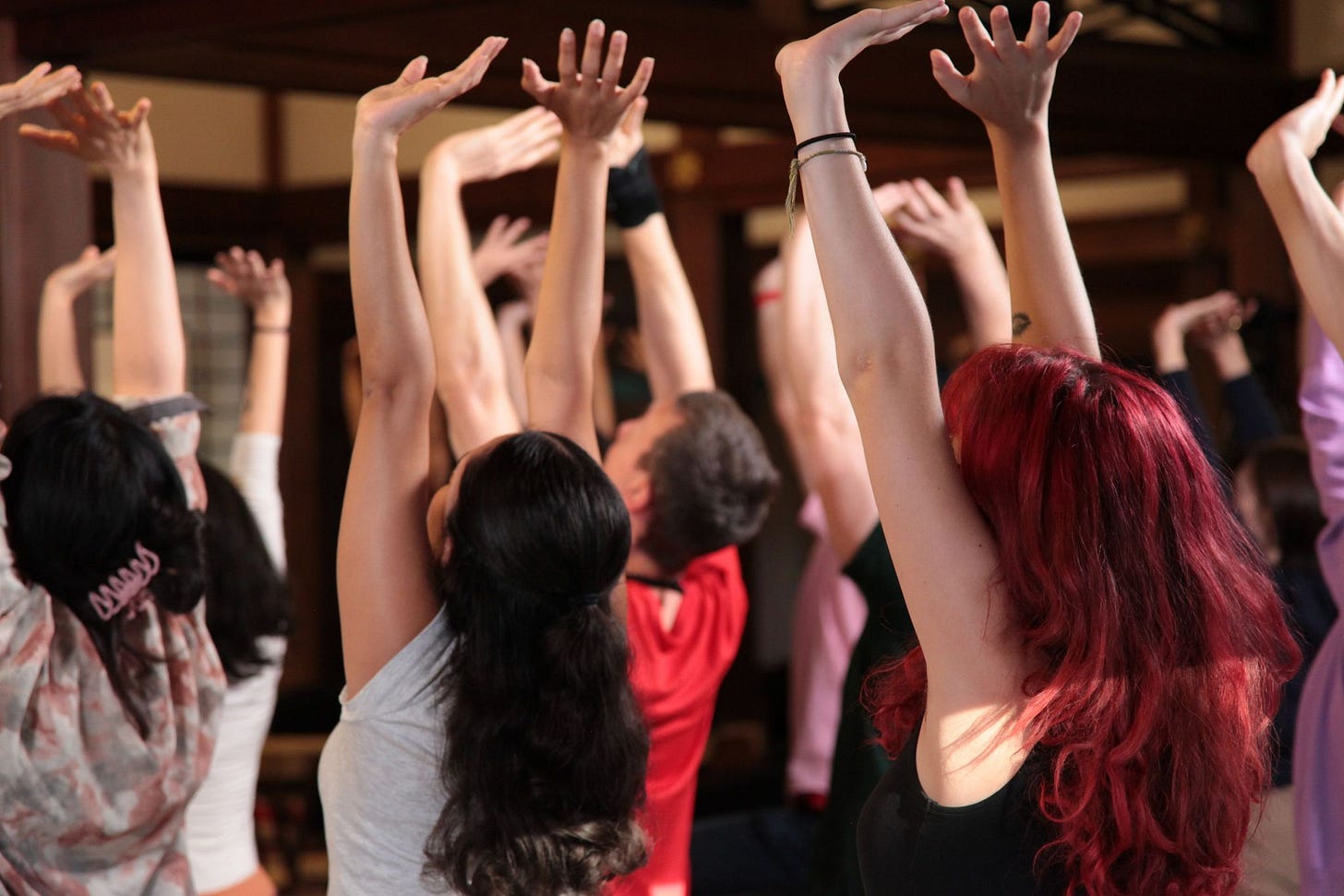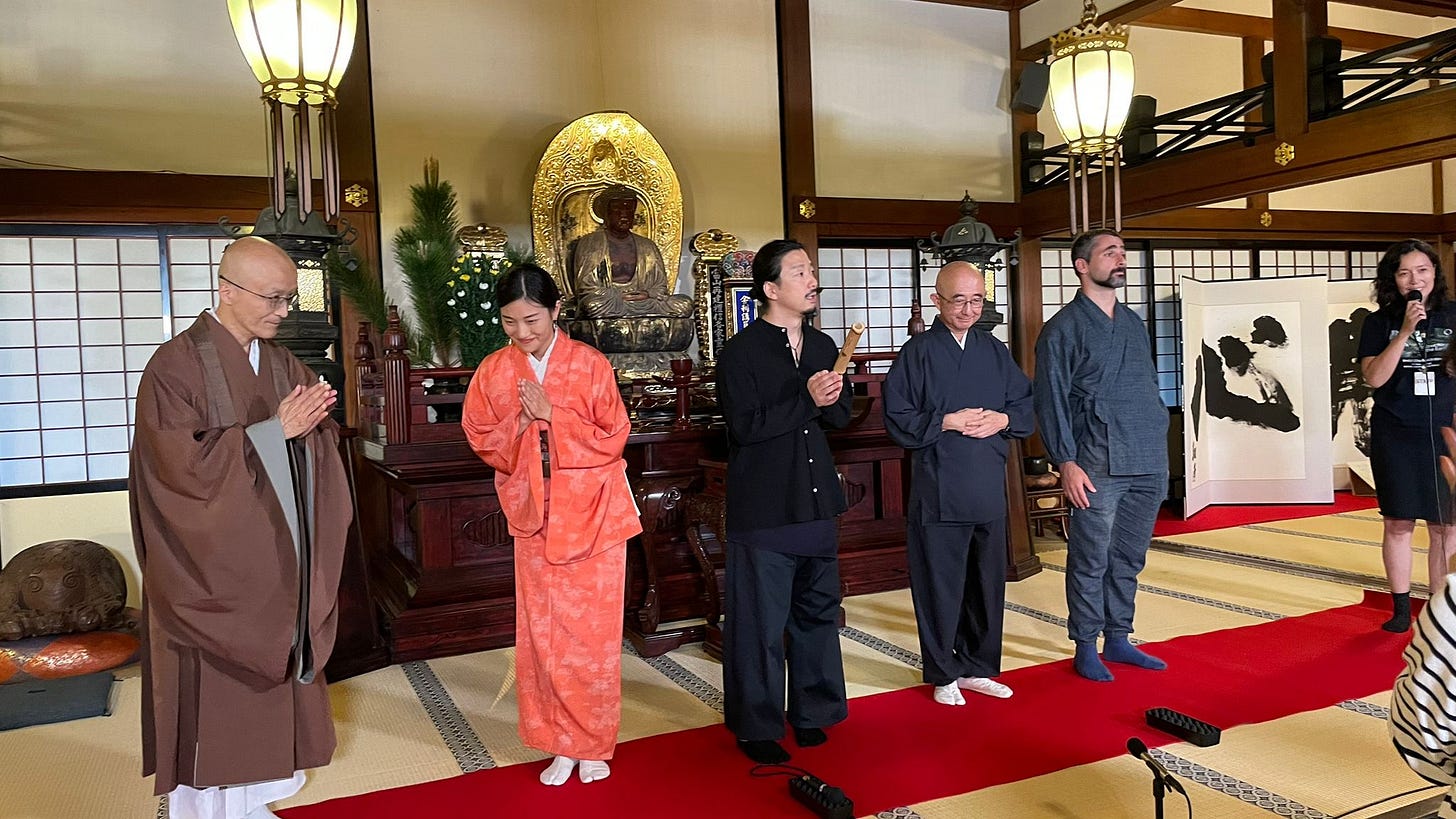Why Do You Eat Udon Noodles?
Zen Wisdom from Nanrei Yokota Roshi
The words that melted my brain last weekend: Why do you eat udon noodles? This was the curt answer given by smiling Rinzai Zen master Nanrei Yokota Roshi, who is the chief abbot at Engakuji temple in Kamakura. I was there to attend the annual Zen 2.0 Conference, which aims to keep the Zen tradition both alive and connected to the general public.
They hosted a Q&A with the Roshi, who usually doesn’t do this sort of thing – especially not to a crowd of mostly non-Japanese speaking people. Every answer he gave was unexpected, irreverent, and I assume totally unsatisfying for 95% of people. In the meantime, my mind was having a zengasmic explosion.
Q: Where can I find the Buddha mind inside of me?
A: Buddha mind is not in you…You are in Buddha mind.
Yes, more!
Q: What important habits are you fostering in your life, Roshi?
A: I’m learning how to do the splits. I’m getting very close!
Subdued laughter that turns to disappointment as people realize that he is being serious.
Q: No, but seriously, what else are you doing?
A: Not sure what you are expecting from me here…
My favorite was this one:
Q: Why Zen? Why should I practice?
A: Why do you eat udon noodles? You just eat!
Laughter and more laughter. Confusion and anticipation for an explanation that never came.
As questions were asked, my mind would grasp onto the question and search for its implications, excitedly waiting for the Roshi’s sage advice. When his response came, all logical reasoning was obliterated in a second. I was relieved.
You see, his talking was the practice. He was giving it to us, right there, in its rawest form. By cutting through the need for a logical answer, he was showing us freedom from our thoughts and incessant thinking. This is how a real pro does it.
But I sensed people didn’t quite get this. They wanted the wise Roshi to be a beacon of light in a dark world. They wanted him to line out, in no uncertain terms, what to do. And to convince them that Zen was the solution.
What they didn’t see was that he was already doing that! The words that made my mind stop were the best teaching one could receive. However, picking up on growing expectations and frustration from the crowd he said, “I trust that the current generation will figure out how to make this relevant.”
The Udon Noodle Koan
It’s natural to want clear answers. When we get Zen koans, or riddles that resist straightforward answers, it can be annoying. Our left-brained, hyper rational minds are left craving more. For heaven’s sake, give me a map already! At the risk of killing the punchline from the Roshi's teachings, it’s worth unraveling this thread to understand his message more clearly. So let’s go back to the udon noodles for a minute.
The Roshi’s answer to “why Zen?” was a seemingly mundane question: “why do you eat udon noodles?” This echoes the idea in the Bahiya Sutta that’s popular in Zen. This text invites you to just be doing what you’re doing without over-complicating it. That means you’re doing one thing at a time and not distracted.
“In the seen, let there be only the seen; in the heard, let there be only the heard; in the sensed, let there be only the sensed; in the cognized, let there be only the cognized.”
Modern Translation: When you’re talking to your friend, just talk to your friend. Don’t look at your phone. When you’re driving, don’t look at your phone. Just drive. When you’re going for a run, it’s not the time to plan your day. Just run and feel your feet hitting the pavement. When you’re taking a shit, just take a shit, don’t check your crypto portfolio.
I’m not joking about the last one. In the oldest text on mindfulness, it clearly states that you should always be mindful, even on the toilet. I’ve had more than one friend who’s had a grand spiritual awakening while in the bathroom. I suspect that the physical and mental release that is naturally part of going to the toilet probably sets up the right conditions for moments of awakening to occur.
Anyways, when you’re paying attention this way – on a run, or on the toilet – you’re in a flow state. The feeling of effortless effort arises naturally, and your sense of self can drop away. In essence, the Roshi was saying that thinking and analyzing isn’t going to get you there. Just practice Zen. If you like it, if you find it useful, you’ll continue. If not, that’s fine. He’s not going to lose any sleep over it, and he certainly isn’t going to try and convince you. That would just be too much effort.
The Limits to Our Logic
More than once I’ve had the experience of trying to solve a problem with many moving parts, like weighing pros and cons for a big decision, but came to a dead-end. Even with a list of clearly-defined factors, it feels unsatisfying, and an underlying tension remains no matter what choice I imagine. However, when I step away from trying to figure it out, a space opens up. The answer bubbles up naturally.
When the Roshi was asked “Why Zen?” he could have easily come up with a list of the wonderful benefits of Zen meditation. After all, he’s been doing this for 50 years. But the answer is a personal truth, and cannot really be answered. When you seriously consider why you do something, the logic starts to quickly break down.
In my own life as a gaijin living in Tokyo, I’ve been asked the question “Why did you come to Japan?” about a thousand times. And I have probably answered it in a thousand different ways. I might start with a long story about my first encounters with the culture, somehow weaving that to the present day. Other times I just simply say, “I had a pull towards Japan that is hard to explain, and now I’m here.” This seems odd, as there should be a clear reason that I came to Japan, right?
Well, I’d made Japanese friends in middle school, so that impression stuck with me. Or was it that I liked watching Yuyuhakusho on Cartoon Network and that drew me in? Perhaps it was a psychological attachment solidified by a visit to Japan during puberty that tied me to the country in a romantic way. Maybe it just seemed like a fun and adventurous thing to do after college.
But if I am honest, I really have no idea which reason is the most true. Each answer to “why” is a tiny sliver of the truth. In fact, I doubt that there is one reason, not to mention my memory isn’t very reliable. These are all stories I tell myself to make sense of my world. These stories are all constructed by my mind. Just like the answer to “why Zen?” my own answer to “why Japan?” isn’t so clear.
When I follow the breadcrumb trail, the inquiry into “why” ends up in an infinite regress. There is an intricate web of causes and conditions, rather than one clear answer. Eventually this inquiry into “why” dissolves and I realize that I simply cannot know. And then all that’s left is this present moment.
So, what we have is a beautiful meditation. In asking the question why, over and over, we realize that there is a lot to reality – including unseen forces that we are completely unaware of. Acknowledging this, we loosen our grip on clinging to logic. The mind softens. We relax into the now and let go of thinking.
Outsourcing our Wisdom
The words of the Roshi did not likely gain him many followers that day. We were mostly left with enigmatic answers to ponder. Any hopes of him becoming a sort of leader for a young generation were not met. And I don’t think he would be particularly disappointed with this outcome.
In a chaotic world, the desire for clear answers increases. It’s natural to want to find a sense of stability amidst the uncertainty. We want strong leaders that can tell us what to do and how to live. However, I believe many of our crises today have been exacerbated by our tendency to put blind faith in others – trusting technology, trusting companies, trusting politicians. It’s risky to outsource our wisdom, even to Zen masters.
I believe that the real wisdom won’t come from his teachings, or anyone’s teachings. Wisdom can only be experienced through an unfolding of your own personal truth. This doesn’t come from being spoon fed answers, because even if you were, it’s unlikely that it would stick.
His most powerful message and teaching that I got was not something I could take with me and hold on to. Rather, he put the ball back in my court. He was telling me to follow my heart and to save myself. Don’t expect other people to do it for you.
When he was invited to share his final message to the audience that day, he simply said, “Forget my teachings. Forget zen” and walked off stage.






Thank you for a sharing this poignant wisdom.